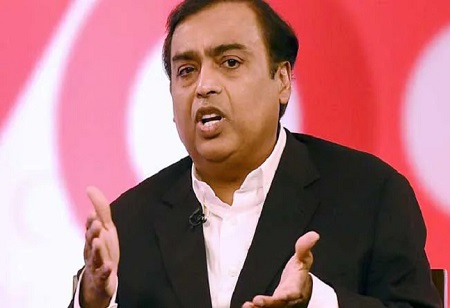The global energy crunch spurred by Russia’s invasion of Ukraine is giving the world’s biggest refining complex a much-needed boost.
Reliance Industries Ltd.’s Jamnagar facility is lifting crude processing and deferring planned maintenance to take advantage of surging demand for diesel, according to people with direct knowledge of the matter. It’s already sending shipments of the fuel to Europe, and this will increase in the coming months, said the people who asked not to be named as the information isn’t public.
The complex in Gujarat state on India’s west coast can process 1.36 million barrels of crude a day from two refineries and is able to export most of the fuel. Owned by billionaire Mukesh Ambani, the 704,000 barrels a day export-focused plant been languishing since the pandemic hit, and only utilized around three-quarters of its capacity in January.
“Reliance has large flexibility in terms of crude
feedstock ratio and yield shifts, and it exports 80% of its output,” said Senthil Kumaran, head of South Asia oil at industry consultant FGE. “That gives it the maximum benefit in strong margin times.”
Some Asian refiners are looking to send diesel abroad as the fuel skyrockets in Europe following Russia’s invasion of Ukraine. Prices there have risen to a premium of as high as $139 a ton over those in Asia, compared with less than $10 for most of last year. Some processors like Reliance are well-positioned to take advantage of the so-called arbitrage trade, but others are struggling with the surging costs for oil and are considering run cuts.
Reliance had planned to shut one of the crude processing units at Jamnagar for about three weeks starting this month, but that’s now been postponed to September, the people said. The export-focused unit utilized only 74.7% of its capacity in January, data from India’s oil ministry show.
Nayara Energy Ltd., 49% owned by Russia’s Rosneft Oil Co. PJSC, also operates a refinery in the Jamnagar area and exports fuel, although in much lower volumes than Reliance. The big state-owned processors, such as Indian Oil Corp., are more focused on the domestic market.
India has so far avoided condemning the invasion of Ukraine and has been abstaining from voting at the United Nations to denounce Vladimir Putin’s aggression. It hasn’t taken part in any sanctions against Moscow and has been urging Russia and Ukraine to hold talks to ease the situation.
State-owned upstream explorer ONGC Videsh Ltd. said earlier this month that it didn’t foresee any challenge in selling crude produced in Russia’s Sakhalin-I project, even after its operator Exxon Mobil Corp. began taking steps to wind down operations before eventually exiting its stake in the development.
